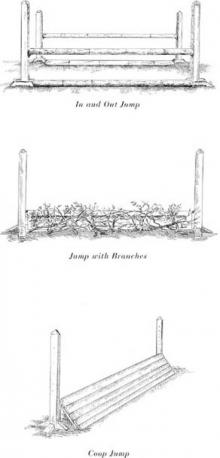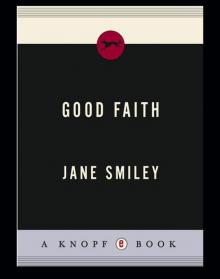- Home
- Jane Smiley
The Greenlanders Page 19
The Greenlanders Read online
Page 19
After a bit, Olaf said, “I might also come to Gardar as a servant. I have the reputation of a good cowman in the Vatna Hverfi district, and I am often called for when something goes wrong at a calving or a bull is difficult to handle. In fact”—Olaf smiled—“I noticed the Gardar bull as I was coming to the residence. The like of such an animal I have never seen before, and not just his size and strength, but his spirit, the way his gaze seeks everything, and the way his skin quivers over his flesh in the sunlight.”
Sira Jon frowned and said, “You speak more warmly of the bull now than you spoke before of the Lord.”
Olaf fell silent again, and Jon got up and began to pace around the room. Finally he told Olaf that he would pray over a decision and send him a message. Olaf stood up and put on his cap. When Jon turned to him, Olaf said, “From these words I know that there is no place for me at Gardar,” and he spoke in his usual low, rough tones, so that he sounded angry. Then he walked out.
And now, Sira Jon, who had been pleased enough to receive Olaf and entertain his supplications, was seized with such anger that he desired to run after the other man and give him his death blow. He remembered nothing of Olaf’s words or demeanor, but only his disrespectful attire and sullen manner of speaking. This was not the first such fit to overtake the priest. As gently as possible, he closed the door of his chamber and threw himself full length before the carved ivory crucifix on the eastern wall, although Satan himself prevented his eyes from lifting to the lovely somber face of the Christ, just as he prevented Jon’s soul from rising out of the fire and shame of his anger. This anger appeared to him as a pool at the bottom of an abyss, and each day of his life in Greenland was spent in threading his way around this flaming tarn on a narrow and rock-strewn ledge. Many days Satan threw him in, propelling him with slight and unexpected provocations, and these days did not get fewer, nor did the fire burn less fiercely. Worse, these angers went unconfessed and unabsolved, as Jon could not bring himself to portray their full intensity to the bishop for some reasons nor to Pall Hallvardsson, for other reasons.
Now he lay on the floor in a state of rigid supplication for a long while, never lifting his eyes to the crucifix but knowing it, even as he knew the knock of Anna Jonsdottir, who was calling him to the bishop. He had, in the past few days, ceased fighting Satan, and now only hoped to contain him within this chamber and within his corpus.
The bishop sat beside his bedcloset in a chair that had been carved for him by his brother in Norway when they were both young men, and it had gone with him everywhere. Now it had come to Greenland, and he sat heavily against the back rail instead of upright, disdaining support, as he had always done. At the front of one of the arms was carved the face of a pig, for St. Anthony, and at the front of the other, a lion, for St. Jerome. The bishop’s eyes were half open, and Anna Jonsdottir was speaking to him as she put morsels of steamed fish into his mouth. “These are good bits, indeed,” she said. “Just as your excellency likes them, with a bit of thyme and butter.” His jaws worked intermittently, but nothing dropped out, and when his mouth was full, he swallowed. “Not the least bone,” she said, and it was true, she was especially careful about removing even the smallest bones. When this delayed her feeding, he groaned, as if the wait were unbearable. Sometimes she put a cup of milk to his lips, and he sipped it. At last his arm flew up, signaling that he had had enough. Anna snatched the trencher away, so that it wouldn’t be knocked across the room, as had happened, and she helped the bishop up, for he had slid far down. He opened his eyes wider. “There you are,” she said, “that bit of fish has strengthened you,” though privately she thought that folk did better with seal blubber and reindeer meat. The front of his gown was covered with a white napkin, and this she took away. Now it would be time for the coming of Sira Jon, and she cocked her ear for the other man’s step. Bishop Alf, too, appeared to be listening, although it was well known to the servingwomen in the residence that he could hardly hear anything anymore. Anna herself had once dropped some utensils and a heavy iron pot, through stumbling over an unevenness in the paving of the floor, and the bishop, sitting in his chair, hadn’t flinched at all. Now Anna turned from the bishop and began arranging the furs and rugs in his bedcloset. Her nose twisted from the smell.
Sira Jon came in, his face white but his manner bustling, and Anna curtsied and moved back toward the wall. Jon began talking at once, saying how well his grace looked today, and that he hoped the bishop had had a pleasant meal. He always talked to the bishop in this way, without stopping for an answer to any of the questions he asked, and without looking into the bishop’s face. Even so, he appeared to Anna to think that the bishop heard him, and that the two were following each other’s thoughts. Indeed, it was true enough that even before his illness the bishop had spoken little but expected Jon to know his thoughts. The servingwomen often gossiped among themselves about how peculiar these Norwegians were, and some attributed their behavior to this, that they were Norwegian, and others declared that it was because of their clerical training. Soon Sira Jon signaled to Anna that she could leave, for he had weighty matters to discuss with the older man in private.
It was always thus that Jon came to his uncle, and always thus that he sat on a low stool at the older man’s feet. When the bishop had been confined to his bedcloset, Jon had sat on this same three-legged stool beside the bishop’s head and leaned in to catch whatever words the bishop uttered. When the bishop had been well and in his high seat, Jon had sat on this same stool with his eyes down, making a similar report. When the bishop, then not a bishop but a simple priest, had come to his sister’s home in Stavanger district, the boy Jon had sat below him thus, and reported upon his progress in learning and holiness.
Now he began with the beasts. “My uncle,” he said without looking up, “I have it from the herdsman’s boy that two lambs have been taken by foxes, and this is one fewer than last year. All of the cows are in good health, and the illness that struck the herd in the spring has, by the grace of God, run its course. Alas, only fifteen calves have survived, but all of them good-sized beasts, as if the sickness culled the weaklings. Surely this, too, shows the care of the Lord for His servants. Stein expects to bring every calf and every cow through the winter. Of the horses, there is this to say, that Lofti is a little lame in the left hind leg and Nonni’s eye still runs with matter, although nothing can be found in it, nor any scratch. So much for the beasts, with them all is as well as can be expected.” And in this way Sira Jon went on talking about first the servingwomen, then the servingmen, then the boys (of which there were but two, but very good boys, from prosperous Brattahlid families, who had brought much property with them), then the assistant priest, Audun, the Greenlander who had been set to the work of making a copy of the liturgical calendar as his first project (although his hand had little grace or beauty, it was clear and readable, perhaps a quality more necessary among the Greenlanders than other qualities).
Above his head, his uncle groaned and shuffled, but it was not Jon’s habit to raise his eyes. Then he spoke of Olaf, although not by name, saying, “It is the case that an older man has come as an applicant, wishing to be trained as a priest, but indeed, he shows little respect for the Lord or His servants, being dressed in tattered, soiled clothes and greedy for food rather than for knowledge of the ways of the Lord.” Here, Jon paused, but the bishop said nothing. “The man,” Jon said, “looks to be unskillful in any but the most menial work, and has no property that he might bring with him to enrich the see. Altogether, considering recent straitened circumstances, a place that might be opened to another should not be opened to this man.” Again Jon fell silent, for the bishop had from time to time chastened him for being hard and fastidious, and dazzled by the surfaces of things. But now the bishop said nothing, and it is a saying in old books that in silence there is approval.
Now Jon enlarged upon a project that he had cherished for some time. “My uncle, the feast of St. Bartholomew is near at hand, and
I wish to say mass in the cathedral on this day, and to clean the cathedral and repair and polish all of the altar furniture with this in view, and not only that, but also to bring out some of the rarely used drapery and vestments.” The bishop made no response, and it occurred to Jon that in silence there might also be disapproval, and he said, “This would be an occasion to announce the Lord and His coming more strongly to the Greenlanders, especially as the time is approaching when rents and tithes are to be paid. Such a mass and celebration I have cherished in my heart for some time, as a way of bringing the Greenlanders to thoughts of the Lord, for this is the time farthest from Yule and Easter, and the thoughts of the Greenlanders are wholly fixed on the harvest and the seal hunt and the slaughter of livestock. Indeed, it seems to me that they show the fury of pagans in this slaughter.” Here, thinking of these things, Jon expected the Devil to fling him into the lake of anger, but it did not occur; he passed safely on.
Now he sat below the bishop in silence for some little while, and then he got to his knees and prayed, and, as always in the company of his uncle, his heart lifted upward, and the words of his prayers flew out of his mouth like birds, and his soul slipped easily into the contemplation of the Lord, and this was the great holiness of the bishop, that his presence cast light upon those around him like sunbeams, and the soul rode these beams as a ship sailing upwards to heaven. It was this more than anything else that prevented Jon from revealing his sin to the bishop, although the bishop was his confessor—in the presence of the bishop it was a task of no little difficulty to recall the substance of his sin. It was as his mother had always declared—the holiness of Sira Alf drove out all else, as the sun drives out darkness, and so it was far better to confess the worst sins, the thickest and darkest sins, to another sort of priest, a man of greater melancholy, as the boy Jon’s parish priest had been. And after this praying, Jon kissed the bishop’s ring and went out.
Anna Jonsdottir found the bishop much slumped down in his seat, and to all appearances asleep. She helped him into his bedcloset and pulled the cloaks and furs up to his chin, for he was beginning to shiver. And so, the bishop went on in much this way, some days better and some days not so well, and it was said by the Greenlanders that he was certainly mending, and would be saying mass again by the beginning of the winter nights, or by Yule, perhaps.
In this autumn, the skraelings returned to Eriks Fjord and Isafjord, and set up their camps and fished and traded with the Norsemen as if the killing of Vestein had never taken place. They had much to trade in the way of furs and especially tusks, and most of the farmers were glad enough to see them, and praised their virtues as hunters and fishermen. But toward Yule a skraeling in his skin boat and carrying his hunting tools paddled near to the shore at Solar Fell. This time a man named Solmund Skeggjason, who was the husband of Ragnvald Einarsson’s daughter Gudny, was gathering shells and driftwood along the strand. It was after mid-day, and the sun glared off the water of the fjord into his eyes, and so he didn’t catch sight of the skraeling. As he stood up with his basket, the skraeling threw his spear and it lodged in Solmund’s viscera and he fell down. The skraeling paddled swiftly away and Solmund sat up and pulled the shaft from his belly, but the spearhead was barbed, for hunting walrus, and it lodged in the flesh. Now Solmund began to creep toward the farmhouse, which was up a steep slope, and when he got to the doorway, he scratched at it. When Ragnvald opened the door, his son-in-law fell inside, saying, “My father, I have gathered a spearhead during my labors, but now I cannot find it again.” At this, the man died, and he was carried into the house.
Now activities became very unusual at Ragnvald’s steading. Each time one of the sons or a servingman or a neighbor came to the house, the door would open to let him in, but no one came out. And this was also unusual, that the skraelings didn’t move off, but stayed in their camps and attended to their business as usual, and none of those who traded with the skraelings heard anything of this killing, and so it was afterwards said that the skraeling had kept this news to himself, and not told his chief about it. It was also the case that the skraelings were living in their winter dwelling houses, which were neatly built stone huts, and not so easy to carry off, or to leave, at this time of the year, as skin booths.
Sometime after the killing, when the fjord was full of ice from shore to shore, the Greenlanders in a group of twenty-two men surprised the skraelings at their camp, and caught a group, including the killer, inside their hut. There were seven men and boys and four women. One of the men ran out, and was killed with an ax, and after this the Greenlanders drove all of the skraelings out by setting fire to brush at the windows and doors of the booth, so that the demons were overcome by smoke, and the skraelings were killed as they tried to escape. However, two of the skraelings escaped under cover of smoke and darkness, and ran out onto the ice of the fjord. They ran all the way across to the opposite shore, although one of them kept falling. Opposite to Solar Fell were two beaches, one a flat, pebbly peninsula forming a little harbor, and the other the steep scree of a mountain. The Norsemen chased the two skraelings toward the steeper beach, and the one who had kept falling down was caught and killed. The other managed to climb up the slippery slope about twelve or fifteen ells. Now Ragnvald came up to the dead one and grabbed his left arm and cut it off with one blow of his ax, and then he raised it high and shouted, “Skraeling! As long as you live, surely you won’t forget your brother!” And then it was dark, and the Norsemen went home, leaving the bodies of the demons out in the ice and snow. When the Norsemen awoke the next day, the skraelings were gone from Eriks Fjord, and by the next day they were gone from Isafjord, and no more was seen of them during that winter.
Kollbein Sigurdsson was much put out by Ragnvald’s actions and said that they endangered the whole settlement, for now he expected that the skraelings would return from the north soon enough, and more of them than the Greenlanders would know what to do with. Others, especially those who had profited by the recent trading, also disapproved of the course the Solar Fell folk had taken, but more said that Ragnvald had earned the second killing by not avenging the death of Vestein, so that the demons had considered themselves free to do as they wished. The years-old killing of Erlend Ketilsson’s ewe was recalled, as well as other thefts and little conflicts, and these were said to show a pattern of increasing audacity. The Greenlanders pointed to the huts of the skraelings, which were empty but tightly built and known to be warm and dry—warmer, in fact, than a Norseman could tolerate, for the skraelings, both men and women, were known to sit about savagely naked—and declared that the way these huts had been built and then left showed a plan, first to take over the farms and pastures of the Greenlanders, and second to go for reinforcements and return. And so Kollbein and the Greenlanders came around to agreement on what was to be expected, but continued to disagree on how Ragnvald and his men should have acquitted themselves. Discussion of this topic raged throughout the winter, and hordes of skraelings in fleets of skin boats were looked for each day, but such a thing did not come to pass, and the settlement was quiet.
This winter was a time of great hunger, especially for the beasts, for the dry harvest had been sparse and the hay poor in quality, and then the snows came early and deep, around Eriks Fjord in particular, so that it was hard, and then impossible, for the sheep to paw through to their forage. Three times before Yule Margret Asgeirsdottir went on skis across Eriks Fjord with Asta Thorbergsdottir, carrying the child tied in a cloak on her back, as she had carried Gunnar as a young girl. Each time she dragged home as much hay as Marta could give her, but the last time she saw that she dared not ask again without putting the Brattahlid beasts at risk. In addition to the hay, Marta gave her a large quantity of dried reindeer meat, but this, too, Margret saw was ill-spared, for the Brattahlid folk were numerous. After this, Margret declared to Asta that they would not cross the fjord again, but would be sparing of what they had and pray for God’s bounty. Now the Gunnars Stead ewes died, and under t
he thick wool, Margret could feel the ribs and spine as if there weren’t any flesh on the animals at all. Sometime before the beginning of Lent, a servingman from Brattahlid came to them with a few provisions—some butter, cheese, and dried sealmeat. Margret saw that he was gaunt and exhausted from the crossing, which in other years folk did for pleasure on fine winter days.
The child Jonas was now nearly half a year old, with just the finest down on his domed head, which Asta declared signified a thick mane of fair hair to come. Asta was very fond of the infant, and chattered about him to Margret from morning until bedtime. Her examination of his parts brought those same parts of his father so vividly into Margret’s imagination that Skuli seemed to inhabit their tiny dwelling like the folk in old stories who refused to stay in their graves, but rode roof peaks and guarded doorways, tormenting the living inhabitants of the steading. Asta was eloquent on the subject of the boy’s hands, which were large and, according to her, unusually dexterous. He certainly liked above all things to take bits of stuff into his hands and gaze upon them. But this was too much like Skuli and his eternal carving, and Margret found in his evident pleasure a burning pain to go with the pain of her dreams, which continued unabated to resurrect the Norwegian each night so that he died again each morning, only to be replaced by his son at the breast, suckling furiously.
After the visit of Marta’s servingman, the two women ate but a single meal each day, and this consisted of two morsels of dried reindeer meat for Margret and one for Asta, a bit of cheese for each, some pieces of dried seal blubber for Margret, and a small bowl of sourmilk mixed with dried, powdered seaweed. Even with the seal blubber, which folk said always assured a copious milk supply, Jonas began to suckle more often, so that he was almost always at the breast, and still grew thinner, and he was smaller than he had been at the beginning of winter. Now Asta spoke less of the boy and always of the food at Marta Thordardottir’s table, where, she said, every meal was a feast, and all the servingfolk ate as much as they pleased.

 The Georges and the Jewels
The Georges and the Jewels Pie in the Sky: Book Four of the Horses of Oak Valley Ranch
Pie in the Sky: Book Four of the Horses of Oak Valley Ranch Duplicate Keys
Duplicate Keys Charles Dickens
Charles Dickens Good Faith
Good Faith Private Life
Private Life A Thousand Acres: A Novel
A Thousand Acres: A Novel The Greenlanders
The Greenlanders Ten Days in the Hills
Ten Days in the Hills Gee Whiz: Book Five of the Horses of Oak Valley Ranch
Gee Whiz: Book Five of the Horses of Oak Valley Ranch A Thousand Acres
A Thousand Acres The All-True Travels and Adventures of Lidie Newton
The All-True Travels and Adventures of Lidie Newton Ordinary Love and Good Will
Ordinary Love and Good Will Taking the Reins (An Ellen & Ned Book)
Taking the Reins (An Ellen & Ned Book) The Man Who Invented the Computer
The Man Who Invented the Computer Horse Heaven
Horse Heaven The Age of Grief
The Age of Grief Riding Lessons
Riding Lessons Perestroika in Paris
Perestroika in Paris A Good Horse: Book Two of the Horses of Oak Valley Ranch
A Good Horse: Book Two of the Horses of Oak Valley Ranch Saddles & Secrets (An Ellen & Ned Book)
Saddles & Secrets (An Ellen & Ned Book) Some Luck: A Novel
Some Luck: A Novel Champion Horse
Champion Horse Some Luck
Some Luck Gee Whiz
Gee Whiz Barn Blind
Barn Blind A Thousand Acres (1992 Pulitzer Prize)
A Thousand Acres (1992 Pulitzer Prize) Pie in the Sky
Pie in the Sky True Blue
True Blue A Thousand Acres_A Novel
A Thousand Acres_A Novel A Good Horse
A Good Horse